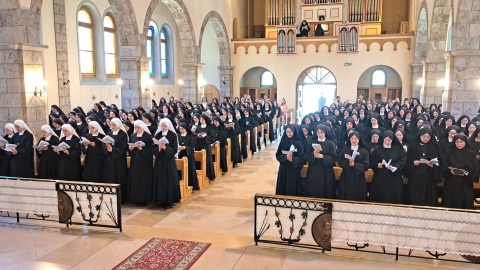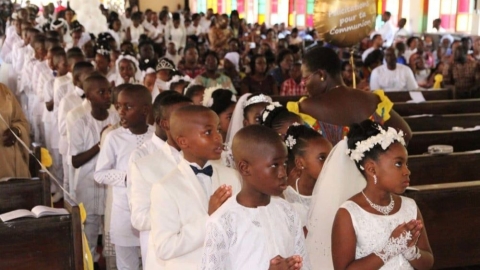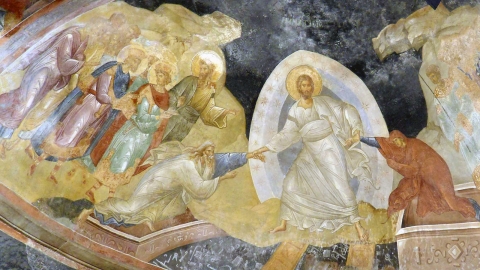“I want to tell you a story...”

Dress rehearsal for the play
These are the first few words of Lepanto, a play that you certainly don’t know. You have never seen it performed and were totally unaware of its existence.
These are the first few words of Lepanto, a play that you certainly don’t know. You have never seen it performed and were totally unaware of its existence.
That is quite alright. It is completely new. Lepanto is more than a simple play, and... we would love to tell you about it.
Nairobi (Kenya), in early October 2023: a new academic year begins for the small new international school, Holy Cross, run by the FSSPX. But this year is not like the others; it marks the tenth-year anniversary of the institution’s founding. This must be celebrated.
Celebrated, yes, but not only celebrated—the occasion must be marked by doing something which could, all at once, show the vitality of this place, confirm our character and our Faith, render homage to the past... and—why not?—do a bit of marketing.
A rather vague guideline to being with, to which we had to give breath, a body, a direction... and concretely, a name. We started with a drama—time for theater! Two questions legitimately arose: why and how?
Why?
The idea for a large-scale play immediately won over the faculty. Indeed, this format has potential that our little institution would quickly put to good use: the diversity of talents.
Based on the Cambridge curriculum, every afternoon after the required courses, our school offers what we call Clubs. Whether academic, sports-related, or artistic, these clubs have only one goal: to allow the children to be better where they are already good. And it is within these clubs that Lepanto was put together.
Rather than everyone working in their own corners, the pooling of our different clubs allowed remarkable teamwork, where each child, with his particular art, contributed to the harmony of the whole. Theater, choir, instruments, dance, journalism, stunts, poetry, drawing, calligraphy, and crafts... there was something for everyone, allowing everyone to progress in their own particular disciplines.
Still in this ‘why’: how was the theme “Lepanto” chosen? It must be admitted that behind the scenes, at first, it was a simple joke. But the joke lasted, and we had to face the facts: it was a good idea. Bold... but good nonetheless.
This historical event, revisited and fictionalized, attracted us for its enormous teaching potential. This play would form not only our children in terms of their art, but also their souls. It was an opportunity to summarize in 52 minutes numerous Christian values and virtues.
The importance of the Faith and the sacraments, the beauty of Christianity and truly Catholic families, the necessity of true devotion to Our Lady, the primacy of the common good, courage, generosity, essential charity... All these values and many others would be present.
Putting our art and our talents at the service of the True and the Beautiful: such was indeed our objective. This is the real answer to our ‘Why?’
How?
As for ‘How?’... Eh! Well, by rolling up our sleeves. We only had a month and a half to complete the adventure. There wasn’t a minute to lose.
We had to start. We had to think about... writing the play. The outlines were made in a few hours, and the script was composed in a week, in order to allow our actors (who had never really participated in a ‘real’ play) to tackle the work of memorization as quickly as possible.
Another week passed in feverish learning, while at the same time, we built the essential stage platform, all while thinking about the sets and their mechanisms.
The challenges started to build up. How do we costume our actors in a country where hoodies and crocs are the clothing of the average person? How do we explain acting and moving on stage and backstage to children who have never been to a theater performance? Time was running out.
We had to organize a Theater camp: three intensive days in which our actors attended workshops—vocal techniques, memorization, and expression; stage combat for some, dancing and singing for others. The play began to take shape.
But it was the first costumes that brought magic into the school. The majority of them were made by our own efforts. The children gradually developed in their roles and the sets were added while the staging became more refined.
A week before the performance, a terrible reality hit us: the microphones would never be enough. We had to make a decision: playback. The play would have a long soundtrack to which our actors would perform. We therefore had to go to a recording and editing studio—long and stressful work: there was not enough time, and our students had never done it like this.
But the Good Lord seemed to want this play, and the dress rehearsal was a success. To crown it all, one of our faithful went out of his way to procure for us a complete set of lights, adding a captivating atmosphere to the play. All that was left was to take the plunge. November 18. Before a large audience, Lepanto was performed. And the show was a success.
The adventure would have stopped there. The some 300 people present for this performance would have been the only ones to see this play. But it was not so.
We wanted as many people as possible to benefit from this experience. So a team of cameramen came to film the play, and two weeks of intensive editing transformed the play into a film, making each act an episode.
With the financial help of a French benefactor, there were a few more hours of translation and editing work: here is the film in its original English, with French subtitles. All that is left is for you to watch it and form your own opinion. Our wish is for this play to be widely distributed, and for the values it advocates to be widely adopted.
Yes, things are happening in Africa. Yes, even more things could happen. Lepanto was made possible thanks to the good graces of the good God as well as your generosity.
If our children move you, perhaps you could consider helping us—to expand our school, to provide academic assistance, to allow all these children to grow up in a truly Catholic atmosphere... You can do all of this.
And who knows if next year, our dear students might offer you a new film? Its theme? ... St. Joan of Arc... An intriguing idea.
(Source : District d’Afrique – FSSPX.Actualités)





